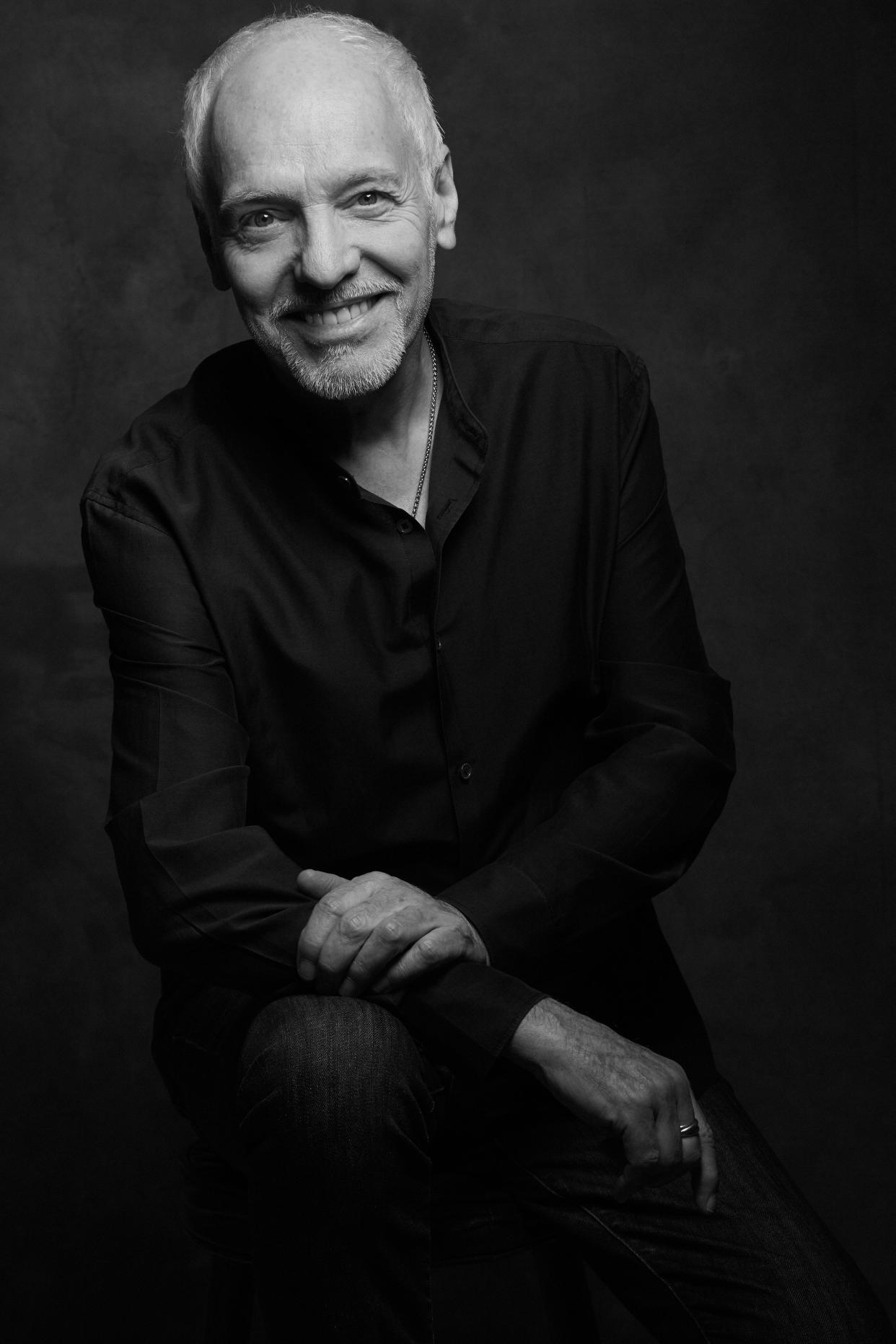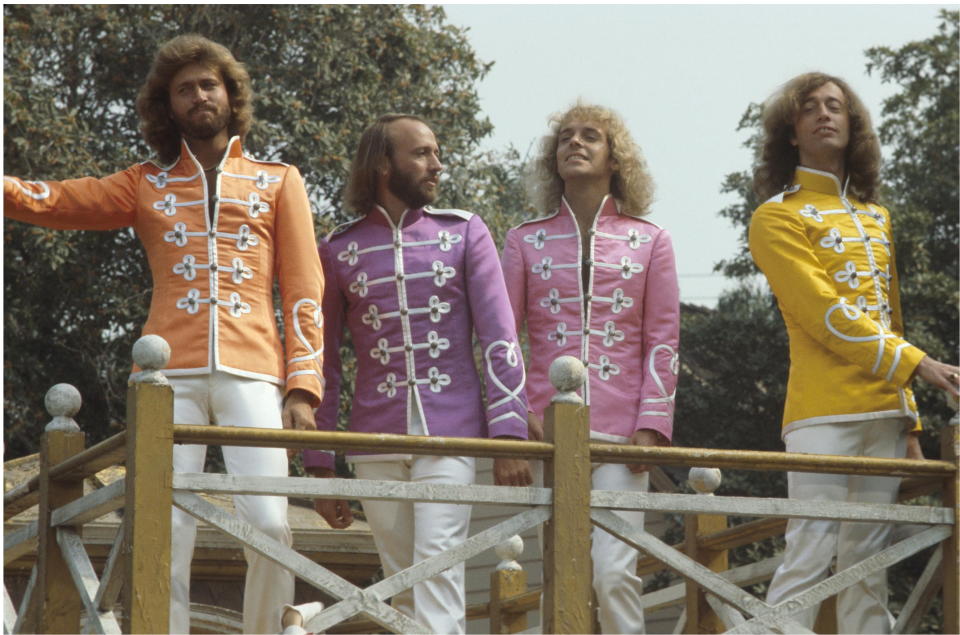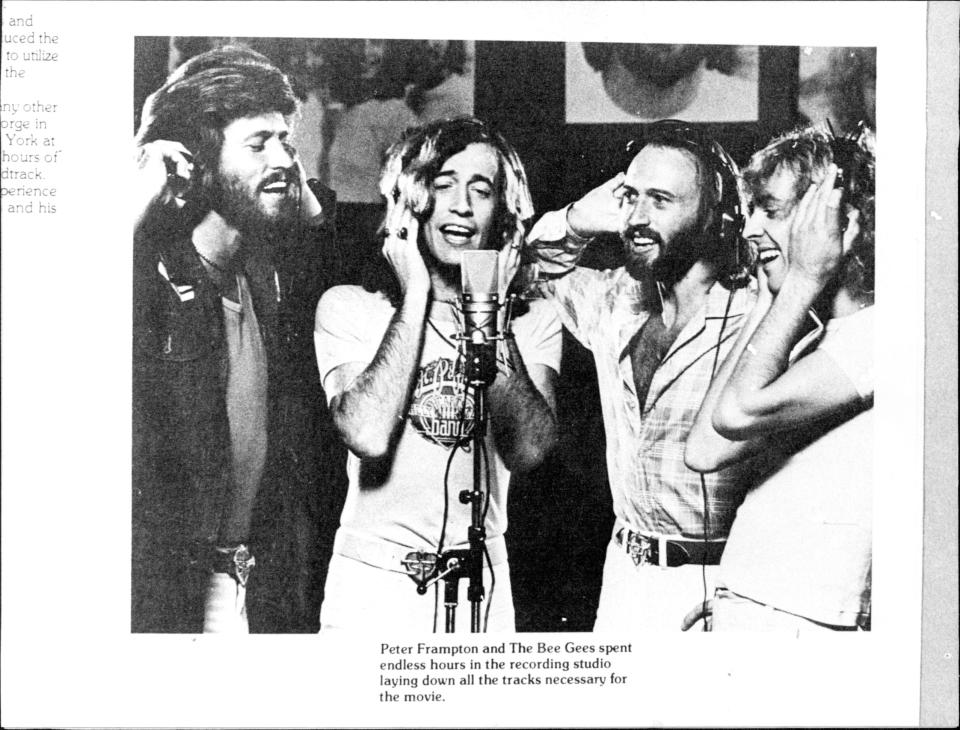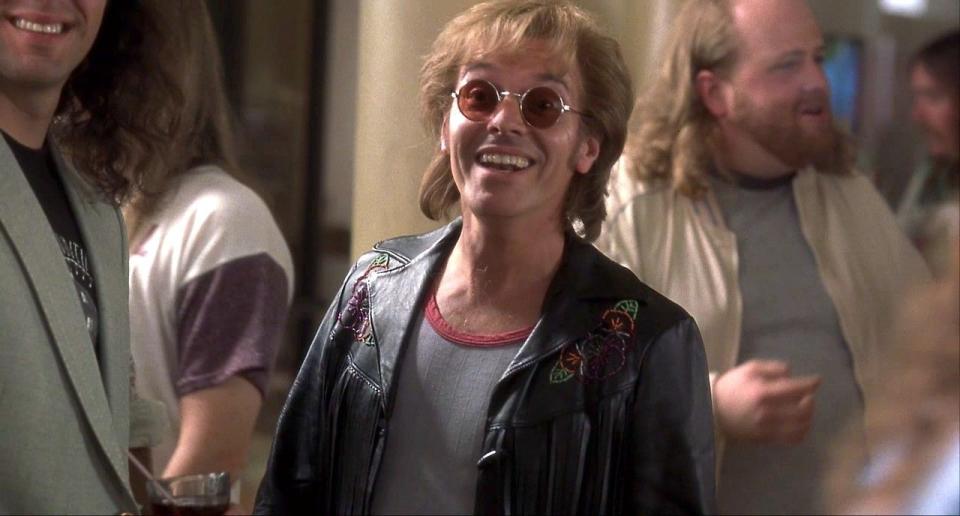Peter Frampton opens up about cinematic highs and lows: "I feel like 'Almost Famous' kind of canceled out 'Sgt. Pepper'"

When guitar great Peter Frampton announced his farewell tour in 2019, he decided that it was time to also announce that he’d been living with a rare degenerative muscular disease, inclusion body myositis (IBM), for several years. “There had to be an explanation why. Like, ‘You look great. You're playing great. So, why are you stopping? Why is this the finale tour?’ I had to give a reason,” he tells Yahoo Entertainment. “And I’ve always said that I'm not going to put a step on the stage if I can't play as good as I can today, because live performance is such a passion for me. I enjoy it so much that to go out there and not to play as well would be devastating for me — and especially hearing people maybe say, ‘He's good, but he's not as good as he used to be.’ I never really wanted to hear that.”
While Frampton accepts that “things are winding down as far as live playing,” he shows no signs of slowing down in the studio, as he has been “binge recording” — that is, stockpiling material to release over the coming years. “As far as writing or a recording or anything like that, if I have to crawl into the console, I will do that all my life. I can’t help myself,” he asserts. “We’ve recorded enough for two blues albums, so we have another one of those in the can. Because I didn’t know how long I could play, how long I was going to be able to play and have the muscles in my fingers work. And that’s why I did the next record, which is an instrumental covers record, because I didn’t have to write, and therefore we could record very quickly. That’s three projects. And then we started a solo album, which is all brand-new material, because I started getting inspired. So, another solo album is coming out.”
However, Frampton adds: “If you’ve read the book, then you know that I once released an album way before [I was ready] because everybody else wanted me to release it. I went along with it. That was the I’m in You record. And I won’t be doing that this time! It might be years before the solo album comes out, because I’ve got a challenge: I want to make the best studio record of my entire career. And I’m going to do it.”
The book that Frampton is referring to is Do You Feel Like I Do?: A Memoir, a taking stock of the 70-year-old rock legend’s rollercoaster life. The autobiography of course includes the whirlwind period between 1976 and 1978, when the phenomenal success of Frampton Comes Alive!, which set a record at the time as the best-selling album in chart history, was followed by a serious car accident; the rushed release and subsequent commercial disappointment of I’m in You; and, of course, the box-office bomb Sgt. Pepper’s Lonely Hearts Club Band.
A “too big to fail” project masterminded by entertainment industry honcho Robert Stigwood (whose cinematic successes of the era included Saturday Night Fever and Grease), the bizarre Sgt. Pepper movie musical starred such ‘70s luminaries as the Bee Gees, Steve Martin, George Burns, Alice Cooper, Sha Na Na, Carol Channing, and an actual Fab Four cohort, Billy Preston. Hardly anyone in the critically panned film emerged unscathed, except for maybe Aerosmith and Earth, Wind & Fire — but Frampton, who was cast as romantic lead Billy Shears, was the main target of the ensuing backlash. It took years for his career to recover, and the movie certainly didn’t serve as the Hollywood launching pad that Frampton had hoped it would be.
“I had just received a potential deal — I’d met with Orion Pictures’ Mike Medavoy, and I had a three-picture deal after Sgt. Pepper,” he recalls. “And of course, that disappeared into the wastebasket after Sgt. Pepper came out.”
Frampton elaborates: “I was ripe for that. I had just become the biggest-selling recording artist in the world, selling the most records ever in the United States, toppling Carole King’s record. It's the build-you-up-to-knock-you-down syndrome, isn't it? Whatever sells papers. So, if you're up at the top and you make a mistake, they’re going to go after you, which is fair game. But the reason I took most of the blame is that my name was on the top of everybody. My name was above the Bee Gees. I think a lot of great actors, they always say, make sure you have somebody else’s name with you on that first screen when they say who’s starring in the movie. Because if it’s just you, you’re going to take the full brunt of it. And I did.”

Frampton writes in Do You Feel Like I Do? that he had a bad feeling about Sgt. Pepper from the start, and that when he had to miss the premiere because he was in the hospital recovering from his multiple injuries from the car crash, he was secretly relieved. (Frampton’s mother attended the premiere in his place; she reported back to him that during the scene when a distraught Billy Shears, mourning the death of his girlfriend Strawberry Fields, considers leaping out of a window, the theater audience chanted, “Jump, jump!” Frampton knew that was not a good sign.)
“It was a disaster from the beginning,” Frampton recalls. “Once I arrived on the set that first day, I guess I could have walked off, but it would have probably cost millions, and I’d have got sued and everything. So, I just went along with it at that point.”
It’s frankly surprising that Frampton was so willing to write about the Sgt. Pepper debacle in his autobiography, or that he is discussing it with Yahoo Entertainment at all, considering that for years, the subject was officially off-limits in his interviews. Does this mean he has softened his stance after all these decades, and he now appreciates that the film — with its Speak-&-Spell-voiced robots bleeping their way through “She's Leaving Home,” Cooper as cult leader Reverend Sun doing a spoken-word version of “Because,” and Preston singing “Get Back” while suspended in midair in a gold marching-band suit and go-go boots — has become a beloved cult classic? “No. I haven’t really softened,” he laughs.
However, Frampton explains that he addressed Sgt. Pepper in his memoir because he “would be able to have control over how the story was told.” As it turns out, he reveals that when he agreed to do the movie, he was under the impression that an actual Beatle would be one of his co-stars.
“For me [the real disaster] was finding out that Paul McCartney was not in the movie — which was the only reason I was doing the movie. I said absolutely not at first, until Stigwood got on the phone with me and talked me into doing it. He said, ‘Oh, Paul is doing it.’ I said, “Paul McCartney?’ He said, ‘Yes, Paul is in the movie.’ So I said, ‘Wow, that kind of sanctions the movie for me.’ So it was important to tell everybody [in the book] that there was trickery involved,” says Frampton. “It might’ve been in Stigwood’s mind [that McCartney would be involved], but before I started the movie, I was in England playing a tour day, and the night before we were playing Wembley, Paul and Wings were playing. So I went and saw Paul and Linda, and I’m backstage and I said, ‘I’ll see you on the set,’ that kind of thing. And Paul was like, ‘What? What’s that?’ That was the clarification that I needed that it was all trickery.”
Other actual Sgt. Pepper co-stars, like Cooper and Aerosmith’s Joe Perry, have said that they signed on for the film, despite their own misgivings, mainly for the chance to work with Sir George Martin on the soundtrack. “Yes, that was one of the huge saving graces for me, [to work with] George and Geoff Emerick, the Beatles' engineer,” Frampton says. “I can’t ask George anymore, obviously, but I don’t think he thought it was a great idea in the end. I don’t think it was the right project for him, because he had all these Beatles songs — and no Beatles! And I felt that the Beatles are not just their songs; they are the way they sound and the way they play and everything. We had the most fantastic musicians on the sessions, all A-plus-plus-plus players, and it was an honor to play with them on the soundtrack, but I just felt that if George had known, I wonder whether he thought it was a good idea. It must have been frustrating for him.”

It must have been frustrating for Frampton as well, since he was chummy with the Beatles and had even played on George Harrison’s landmark All Things Must Pass album. But he recalls with a chuckle that the subject of the movie only came up between him and an actual Beatle once.
“I was on the All-Stars tour with Ringo Starr. I’ve known him for years now; we’ve been friends for a long, long time. So, Ringo was in the room when someone was interviewing me for a paper — he was just like making himself a cup of tea or something in the background — and he’s listening in to what I’m saying and then the question comes: ‘So, how do you feel about the Sgt. Pepper movie?’” Lapsing into an exaggerated Liverpudlian accent, Frampton continues: “And I didn’t have time to say anything, because Ringo just went, ‘Ohhhhhhh, we don’t talk about that…’”
Now that Frampton is talking about Sgt. Pepper, despite his claim that he has not “softened,” the experience of writing his memoir seems to have put it in perspective. “I think that the difficulties and battles we all have in life, the ups and downs, it all goes into making you a more experienced and, hopefully, wiser person. Is it a regret? Yes, it is a regret that I did it, and I’m sure Barry Gibb would say the same thing,” Frampton says. (It should be noted that the new Bee Gees documentary, The Bee Gees: How Can You Mend a Broken Heart, skips over the Sgt. Pepper history entirely, as if it never happened.) “But, I did it. It’s part of me, and it’s made me who I am. It’s contributed to who I am, with the tolerance that I had to put up with doing it, you know? So, it’s definitely taught me.”
While Frampton’s three-picture deal did fall through, he eventually received some measure of cinematic redemption 22 years later. “Almost Famous was a phenomenal experience for me,” he writes in his book. “It almost made up for Sgt. Pepper.” Not only did Frampton have a bit part in the critically acclaimed rock film — as the road manager for his real-life former band, Humble Pie — but his longtime pal, director Cameron Crowe, hired him to be a technical adviser, to ensure that all of the rock ‘n’ roll details were authentic.

“[Cameron and I] were great friends. He was the first person to hear Frampton Comes Alive!, outside of the band and management, because he was doing the liner notes. I think he was 16 or 17, but I’m not sure, because his mother hadn't told him yet by then!” Frampton laughs. “But anyway, from that moment onward, we became very good friends, and he saw firsthand exactly what I went through — every detail, basically. He’d seen that I had seen the ups and downs of the business and I’ve been through every level of performing. They needed to be authentic when they had live scenes, and [actor] Billy [Crudup] needed to be an authentic guitar player. I had to teach him the solos and all that stuff, and give Jason Lee direction. Well, obviously I didn't direct, but I was like a library for them. They would come to me and be like sponges. That was the thrilling part for me — imparting my wisdom of what I’d learned over the years, being in the business for 40 years at that point.
“The most important thing was having Billy Crudup appear to be authentic as a Jimmy Page-type character,” Frampton continues. “He’d had about two weeks of [guitar] lessons when I met him. When we went on set, especially for the first six weeks, we were rehearsing. And when we weren’t rehearsing, we’d be in Billy’s trailer and he’d be filming my fingers, so that when I had to go away for a gig or something, he could watch me on video. He had to learn [Pearl Jam guitarist] Mike McCready’s solos and a couple of my solos. So that was my job. And Cameron said to me when we got to the big live date where [fictional movie band Stillwater] were playing in an arena, ‘What will you want to see from Billy that will make you, the guitar player, believe that Billy is truly a guitar player? A rock god, as it were?’ And I said, ‘When he has his fingers on the right note and he closes his eyes and he puts his head back.’ I think that was one moment at the perfect time when it was like, ‘Oh my God, Billy Crudup is just the best.’ I mean, Cameron and I high-fived at that point. I’ve got goosebumps just talking about it.”
Adds Frampton, “It was wonderful, because now I know what it’s like to be in the worst rock movie ever made, and I know what it's like to experience being a very small part of one of rock’s greatest movies. So, I feel like Almost Famous kind of canceled out Sgt. Pepper.”
As for what’s next for Frampton, touring is obviously on hold for the moment, not because of his IBM, but because of COVID-19. But with a new autobiography to reflect upon and a slew of aforementioned album releases ahead of him, he’s making the most of every day. “I think when I’m playing, there’s an extra energy that comes,” he muses. “I think I’m now playing from my soul more, from my heart more, because every note means so much more to me.”
Read more from Yahoo Entertainment:
Follow Lyndsey on Facebook, Twitter, Instagram, Amazon, Spotify

